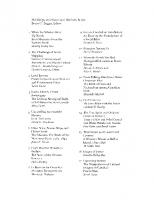Sudanese Intellectuals in the Global Milieu: Capturing Cultural Capital 1793622760, 9781793622761
Sudanese Intellectuals in the Global Milieu: Capturing Cultural Capital propels Sudanese intellectuals into the global i
121 17 584KB
English Pages 342 Year 2022
Table of contents :
Cover
Half Title
Title Page
Copyright Page
Dedication
Contents
Foreword
Acknowledgments
Note to Readers on Transliteration
Part I: Introductory
Chapter 1: More than a Grain of Sand: Opening Outward—Sudanese Thought in a Globalized Milieu
In the Context of the Sudan
In the Context of Global Intellectuals
Richness of the Fields and Contributors, and the Question of Omissions
The Organization of the Book
Uncertainty and Possibilities
Notes
References
Chapter 2: Capturing Cultural Capital: Where to Start, and Which Ideas Matter?
Early Influences on Contemporary Sudanese Thought
Arabic and Sufism
al-Mahdia and al-Azhar
Sudanese Thought during the Condominium Era (1899–1956)
The Colonial Context
The New Intellectuals
Intellectuals’ Hubs
Women Organizing
Ideas and Conflicts
Post-Independence Years (1956–1989)
State Formation and Sudanization
Revolution and Rebellion
Art and Identity
The Four Seasons of May Regime
The 1985 Intifada
The Reign of Political Islam (1989–2018)
Intellectual or Politician
Islamists’ Ideas and Pedagogy
Opposition and Resistance
Revolution Again…
Concluding Comments: Influences on Sudanese Urgent Futures
Notes
References
Part II: Ghosts and Beacons
Chapter 3: Visitations: Dialogue with the Ghost of Dr. John Garang
Prologue
Session One
Session Two
Session Three
Session Four
Session Five
Session Six
Session Seven
Note
Chapter 4: The Beacon: A Glimpse of Suad Ibrahim Ahmed’s Intellectual Life
The Suad I knew
Early Political Awakening of an Organic Intellectual
Sudanese Women’s Union
Sawt Al-Mar’a
University of Khartoum Students’ Union
Wadi Halfa Flooding and the Challenge to Nubian Culture
Educational Policy and Extramural Studies
Contribution to the Arts
Suad, Ever Political and Public Intellectual
Sudanese Revolutions (October and April) and Women’s Rights
South Sudan
Nubian Language
A Gender-Conscious Leader and an Inspiring Socialist Feminist
A Boundless Public Life—Social Media and Suad’s Publishing Company
Last Thoughts about Our Beacon
Editors’ Note
An Addendum: Reminiscing about Suad Ibrahim Ahmed by Fatima Babiker’s Family
Notes
Reference
Part III: Hybridities and Ambiguities
Chapter 5: The Invention of the Northern Sudanese
On the Concept of the Northern Sudanese
Methodology
Why Write It?
The Education of the NS
Arab and Muslim Education
Western Education
Nationalism Education
Conclusion
References
Chapter 6: The Rise and Decline of the Hybridity Thesis in the Intellectual: Discourse on Identity—The Sudan Example
The Writing of Genealogies
The Nationalist Movement
Identity Discussions in Academic Discourses
History Discourse
The Linguistic Factor
Identity Discussions in the Cultural Domain
Al-Fajr Magazine
al-Ghaba wa al-Sahra’ School
Identity Discussions in the Arts
Khartoum School of Art
Music
The Historical and Archaeological Contributions to Identity Questions
Some Concluding Remarks
Notes
References
Part IV: The Production of Intellectuals
Chapter 7: Interrogating the Dilemma of Sudanese Academics: Producing Knowledge or Recycling Ideologies
Structure of the Chapter
Epistemic Communities and Knowledge Production
What Is an Epistemic Community?
From Colonial to Post-Independence Period: 1898–1989
Colonial Period 1898–1956
Post-Independence 1956–1989
Inqaz and Islamization of Knowledge: 1989–2019
Roots of the Islamization of Knowledge
Islamization of Knowledge Institutions
Constrained Epistemic Communities
Concluding Remarks
Notes
References
Chapter 8: The Pioneering Women’s and Gender Studies Intellectuals in the Sudan: Ahfad University for Women
The Need for Women’s and Gender Studies
Ahfad University’s Contribution to Intellectual Thought through Developing the Knowledge of Gender and Feminism
Graduates of Gender Studies
Contribution to Knowledge and Intellectual Thought by Sharing Curriculum Development with Other Universities—Inside and Outside the Sudan
Contribution to Knowledge by the Localization of International Knowledge
Contribution to Intellectual Thought through Research
Gaining Knowledge through Civic Engagement
Challenges Facing the Regional Institute of Gender, Diversity, Peace and Rights (RIGDPR): Some Final Thoughts
References
Part V: Marginalized Intellectual Communities
Chapter 9: “Peace-building” as Thought and Practice in the Nuba Mountains before 2011
Peace Initiative
Antecedents
Ideas and Practices
Team Leader
Health Workers
Aftermath
Reflections
Notes
References
Chapter 10: Portrait of a Woman of Courage: Awadeya Koko, Organic Intellectual
Intellectuals and Higher Education in the Sudan
The Woman Organic Intellectual
Tea Ladies in Khartoum
Understanding Awadeya’s Story
Who Is Awadeya?
NGO Intervention
The Association/Cooperative
From a Prisoner to a President
Becoming a Woman of Courage
Fighting the Stigma
What Do We Learn?
Concluding Remarks
Notes
References
Chapter 11: Life as an Act of Resistance: On Politics and Ideas—Youth Movements in the Sudan
Activism
Theorizing Resistance
Theorizing Youth Movements in the Sudan
Girifna
Politicizing the Public Sphere
Political Identities and Institutionalization
Education without Borders
Politics of Hope
Macro Politics and Youth Movements’ Functionality
Direct Political Change or Social Change?
Utilizing the Slang
Activism and Resistance: Social Media as an Extended Platform versus Offline
The Politics and Ideas of the December 2018 Revolution
An Ongoing Revolution?
Conclusion
Notes
References
Part VI: Mahdists, Feminists, and Humanists
Chapter 12: Al-Sādiq Al-Mahdi’s Intellectualism: Searching the Iceberg
Composition and Platform
Emergence of an Intellect
Islamic Renaissance
Mahdism
Implementation of Shariᶜa
Dialectics between Identity and Modernity
Sociopolitical Thought
Social Justice
Consociational, One-party, and Multiparty Democracies
Gender Agenda
Philosophy
Islamic Philosophy
Ethics
Knowledge
Influences, Classification, and Impact
Notes
References
Chapter 13: Transforming Lives: Fatima Babiker’s Feminist Trajectories
Feminist Interrogations
Reflecting on Fatima Babiker’s Intellectual Contributions
The Personal Is Political: Fatima Babiker as a Teacher
Bridging Academia and Community: Fatima’s Activism
Conclusion
Notes
References
Chapter 14: Francis Mading Deng: Ideas for Bridging Boundaries, Managing Diversity, and Reconciling Differences
Inside-Outside: The Foundation of Deng’s Ideas and Worldview
The Dinka’s Universal Values: Cieng and Dheeng
Tradition and Modernization
Testing and Applying Deng’s Ideas at National Level
Dynamics of Identification
War of Visions and the Vision of a New Sudan
Constructive Management of Diversity
What Divides Is What Is Unsaid: Talking Things Out
Deng’s Global Ideas and Worldview
Identity, Diversity, and Constitutionalism for Africa
Sovereignty as Responsibility
Idealism with Realism
Criticism of Deng’s Ideas
Conclusion
An Addendum: Four Levels of Deng’s Books
Local
National
Regional
Global
Note
References
Index
About the Contributors
Cover
Half Title
Title Page
Copyright Page
Dedication
Contents
Foreword
Acknowledgments
Note to Readers on Transliteration
Part I: Introductory
Chapter 1: More than a Grain of Sand: Opening Outward—Sudanese Thought in a Globalized Milieu
In the Context of the Sudan
In the Context of Global Intellectuals
Richness of the Fields and Contributors, and the Question of Omissions
The Organization of the Book
Uncertainty and Possibilities
Notes
References
Chapter 2: Capturing Cultural Capital: Where to Start, and Which Ideas Matter?
Early Influences on Contemporary Sudanese Thought
Arabic and Sufism
al-Mahdia and al-Azhar
Sudanese Thought during the Condominium Era (1899–1956)
The Colonial Context
The New Intellectuals
Intellectuals’ Hubs
Women Organizing
Ideas and Conflicts
Post-Independence Years (1956–1989)
State Formation and Sudanization
Revolution and Rebellion
Art and Identity
The Four Seasons of May Regime
The 1985 Intifada
The Reign of Political Islam (1989–2018)
Intellectual or Politician
Islamists’ Ideas and Pedagogy
Opposition and Resistance
Revolution Again…
Concluding Comments: Influences on Sudanese Urgent Futures
Notes
References
Part II: Ghosts and Beacons
Chapter 3: Visitations: Dialogue with the Ghost of Dr. John Garang
Prologue
Session One
Session Two
Session Three
Session Four
Session Five
Session Six
Session Seven
Note
Chapter 4: The Beacon: A Glimpse of Suad Ibrahim Ahmed’s Intellectual Life
The Suad I knew
Early Political Awakening of an Organic Intellectual
Sudanese Women’s Union
Sawt Al-Mar’a
University of Khartoum Students’ Union
Wadi Halfa Flooding and the Challenge to Nubian Culture
Educational Policy and Extramural Studies
Contribution to the Arts
Suad, Ever Political and Public Intellectual
Sudanese Revolutions (October and April) and Women’s Rights
South Sudan
Nubian Language
A Gender-Conscious Leader and an Inspiring Socialist Feminist
A Boundless Public Life—Social Media and Suad’s Publishing Company
Last Thoughts about Our Beacon
Editors’ Note
An Addendum: Reminiscing about Suad Ibrahim Ahmed by Fatima Babiker’s Family
Notes
Reference
Part III: Hybridities and Ambiguities
Chapter 5: The Invention of the Northern Sudanese
On the Concept of the Northern Sudanese
Methodology
Why Write It?
The Education of the NS
Arab and Muslim Education
Western Education
Nationalism Education
Conclusion
References
Chapter 6: The Rise and Decline of the Hybridity Thesis in the Intellectual: Discourse on Identity—The Sudan Example
The Writing of Genealogies
The Nationalist Movement
Identity Discussions in Academic Discourses
History Discourse
The Linguistic Factor
Identity Discussions in the Cultural Domain
Al-Fajr Magazine
al-Ghaba wa al-Sahra’ School
Identity Discussions in the Arts
Khartoum School of Art
Music
The Historical and Archaeological Contributions to Identity Questions
Some Concluding Remarks
Notes
References
Part IV: The Production of Intellectuals
Chapter 7: Interrogating the Dilemma of Sudanese Academics: Producing Knowledge or Recycling Ideologies
Structure of the Chapter
Epistemic Communities and Knowledge Production
What Is an Epistemic Community?
From Colonial to Post-Independence Period: 1898–1989
Colonial Period 1898–1956
Post-Independence 1956–1989
Inqaz and Islamization of Knowledge: 1989–2019
Roots of the Islamization of Knowledge
Islamization of Knowledge Institutions
Constrained Epistemic Communities
Concluding Remarks
Notes
References
Chapter 8: The Pioneering Women’s and Gender Studies Intellectuals in the Sudan: Ahfad University for Women
The Need for Women’s and Gender Studies
Ahfad University’s Contribution to Intellectual Thought through Developing the Knowledge of Gender and Feminism
Graduates of Gender Studies
Contribution to Knowledge and Intellectual Thought by Sharing Curriculum Development with Other Universities—Inside and Outside the Sudan
Contribution to Knowledge by the Localization of International Knowledge
Contribution to Intellectual Thought through Research
Gaining Knowledge through Civic Engagement
Challenges Facing the Regional Institute of Gender, Diversity, Peace and Rights (RIGDPR): Some Final Thoughts
References
Part V: Marginalized Intellectual Communities
Chapter 9: “Peace-building” as Thought and Practice in the Nuba Mountains before 2011
Peace Initiative
Antecedents
Ideas and Practices
Team Leader
Health Workers
Aftermath
Reflections
Notes
References
Chapter 10: Portrait of a Woman of Courage: Awadeya Koko, Organic Intellectual
Intellectuals and Higher Education in the Sudan
The Woman Organic Intellectual
Tea Ladies in Khartoum
Understanding Awadeya’s Story
Who Is Awadeya?
NGO Intervention
The Association/Cooperative
From a Prisoner to a President
Becoming a Woman of Courage
Fighting the Stigma
What Do We Learn?
Concluding Remarks
Notes
References
Chapter 11: Life as an Act of Resistance: On Politics and Ideas—Youth Movements in the Sudan
Activism
Theorizing Resistance
Theorizing Youth Movements in the Sudan
Girifna
Politicizing the Public Sphere
Political Identities and Institutionalization
Education without Borders
Politics of Hope
Macro Politics and Youth Movements’ Functionality
Direct Political Change or Social Change?
Utilizing the Slang
Activism and Resistance: Social Media as an Extended Platform versus Offline
The Politics and Ideas of the December 2018 Revolution
An Ongoing Revolution?
Conclusion
Notes
References
Part VI: Mahdists, Feminists, and Humanists
Chapter 12: Al-Sādiq Al-Mahdi’s Intellectualism: Searching the Iceberg
Composition and Platform
Emergence of an Intellect
Islamic Renaissance
Mahdism
Implementation of Shariᶜa
Dialectics between Identity and Modernity
Sociopolitical Thought
Social Justice
Consociational, One-party, and Multiparty Democracies
Gender Agenda
Philosophy
Islamic Philosophy
Ethics
Knowledge
Influences, Classification, and Impact
Notes
References
Chapter 13: Transforming Lives: Fatima Babiker’s Feminist Trajectories
Feminist Interrogations
Reflecting on Fatima Babiker’s Intellectual Contributions
The Personal Is Political: Fatima Babiker as a Teacher
Bridging Academia and Community: Fatima’s Activism
Conclusion
Notes
References
Chapter 14: Francis Mading Deng: Ideas for Bridging Boundaries, Managing Diversity, and Reconciling Differences
Inside-Outside: The Foundation of Deng’s Ideas and Worldview
The Dinka’s Universal Values: Cieng and Dheeng
Tradition and Modernization
Testing and Applying Deng’s Ideas at National Level
Dynamics of Identification
War of Visions and the Vision of a New Sudan
Constructive Management of Diversity
What Divides Is What Is Unsaid: Talking Things Out
Deng’s Global Ideas and Worldview
Identity, Diversity, and Constitutionalism for Africa
Sovereignty as Responsibility
Idealism with Realism
Criticism of Deng’s Ideas
Conclusion
An Addendum: Four Levels of Deng’s Books
Local
National
Regional
Global
Note
References
Index
About the Contributors

- Author / Uploaded
- Gada Kadoda
- Sondra Hale (eds.)









